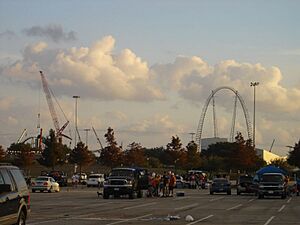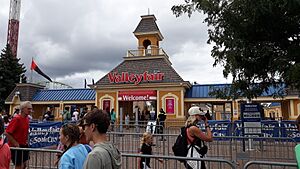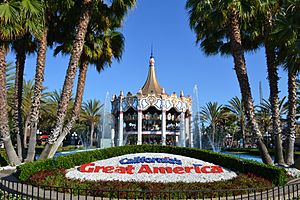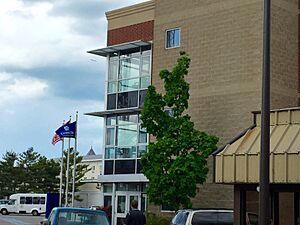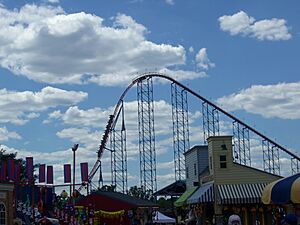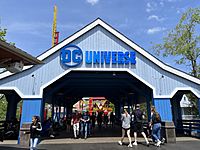Six Flags facts for kids

Logo used since 2024
|
|
| Public | |
| Traded as |
|
| Industry | Amusement parks |
| Predecessors |
|
| Founded | July 1, 2024 |
| Headquarters | Charlotte, North Carolina, U.S. |
|
Number of locations
|
42 (2026) |
|
Area served
|
|
|
Key people
|
Marilyn Spiegel (board chair) John Reilly (CEO and president) |
| Brands |
|
| Services |
|
| Revenue | |
|
Operating income
|
|
| Total assets | |
| Total equity | |
| Members | |
|
Number of employees
|
|
| Footnotes / references Financials as of December 31, 2024[update]. |
|
Six Flags, officially known as Six Flags Entertainment Corporation, is a big American company that runs amusement parks. Its main office is in Charlotte, North Carolina, in the United States. The company owns and operates 42 fun locations. These include 27 amusement parks and 15 water parks. Nine of these locations also have hotels or resorts right on site.
Six Flags was created on July 1, 2024. It was formed when two long-time rival companies, Cedar Fair and the original Six Flags company, decided to join forces. This made the new Six Flags the largest company of its kind in the world. After the merger, which was worth about $8 billion, the former Cedar Fair owners held a slightly larger share of the new company. The name "Six Flags" was kept, but the company's stock symbol on the New York Stock Exchange became "FUN," which was Cedar Fair's old symbol.
Six Flags has special agreements to use popular characters in its parks. In most parts of the United States and Mexico, you can find Warner Bros. characters like the Looney Tunes and heroes from DC Comics. Some parks also feature Peanuts characters through a different agreement. The company also offers a special system called Fast Lane. This lets visitors skip the regular lines for rides. In 2024, Six Flags parks welcomed 50.3 million guests. This made it the fifth most visited theme park company globally. Outside the U.S., Six Flags has two parks in Mexico, two in Canada, and one in Saudi Arabia.
Contents
The Story of Six Flags: How It All Began
The Original Six Flags Company
The first Six Flags theme park, Six Flags Over Texas, opened in August 1961. It was started by Angus G. Wynne and other investors. Over the years, the company grew by building new parks and buying others. In 1984, Six Flags gained the rights to use Warner Bros.' Looney Tunes characters. Later, Time Warner (now Warner Bros. Discovery) owned Six Flags completely for a few years.
In 1998, another company called Premier Parks bought Six Flags. Premier Parks then started changing the names of many of its own parks to Six Flags. By 2000, the company was fully known as Six Flags.
During the 2000s, the original Six Flags company faced some tough times. It had to sell off some of its parks, including those in Europe. The company also went through changes in its leadership. In 2009, Six Flags needed to reorganize its finances but kept its parks running. It came out of this period in 2010 as Six Flags Entertainment Corp. The main offices moved from New York City to Grand Prairie, Texas.
New leaders tried to build Six Flags parks in other countries. Projects in Dubai and China were planned but later canceled or sold. The COVID-19 pandemic in 2020 also caused many parks to close for a while. In 2021, a new CEO, Selim Bassoul, tried a different plan. He aimed to improve guest experience by raising prices to reduce crowds. However, this plan led to fewer visitors and was stopped in 2022.
The Cedar Fair Story
The story of Cedar Fair began in 1978. That's when the Cedar Point amusement park in Sandusky, Ohio, bought Valleyfair amusement park. This led to the creation of Cedar Fair Limited Partnership in 1983. The name "Cedar" came from Cedar Point, and "Fair" came from Valleyfair. The company became publicly traded in 1987.
Cedar Fair grew by buying more amusement parks across the United States. These included Dorney Park (1992), Worlds of Fun (1995), Knott's Berry Farm (1997), and Michigan's Adventure (2001). In 1997, Cedar Fair also gained the rights to use Peanuts characters in its parks.
In 2006, Cedar Fair bought Paramount Parks for $1.24 billion. This added five more theme parks to its collection. Cedar Fair later decided not to use the Paramount-licensed characters long-term. The company also sold California's Great America in 2022 to help reduce its overall debts.
A New Chapter: The Merger
The Big Announcement
 |
|

Pre-merger logos of Cedar Fair and the former Six Flags company.
|
|

The logo of the newly formed Six Flags following merger completion, used since July 1, 2024.
|
|
| Initiator |
|
|---|---|
| Type | Merger of equals |
| Cost | US$8 billion (all-stock deal) |
| Initiated | November 2, 2023 |
| Completed | July 1, 2024 |
| Resulting entity | CopperSteel HoldCo, Inc. (renamed to Six Flags Entertainment Corporation) |
| Status | Completed |
On November 2, 2023, Cedar Fair and the original Six Flags company announced they would merge. This happened about four years after Six Flags first tried to buy Cedar Fair. The companies decided to merge to become stronger and offer more fun to guests. They hoped to save money and compete better with other big theme parks. The merger created a huge company with 27 amusement parks, 15 water parks, and 9 resort properties. This made it the largest amusement park operator in North America.
The merger was called a "merger of equals." This meant that both companies joined together to form a new one. Cedar Fair shareholders owned 51.2% of the new company, and Six Flags shareholders owned 48.8%. The new company was first called CopperSteel HoldCo, Inc., but then changed its name to Six Flags Entertainment Corporation. It started trading on the New York Stock Exchange under the symbol FUN.
Getting Approval
The leaders of both companies quickly approved the merger. Government groups in the United States and Mexico also reviewed the plan. On January 25, 2024, Mexico approved the merger. The U.S. Department of Justice gave its approval on June 26, 2024. This allowed the companies to complete their merger on July 1, 2024. Not everyone agreed with the merger plan, but it went ahead.
After the Merger: New Operations
After the merger on July 1, 2024, new leaders took charge. Richard Zimmerman, who was the CEO of Cedar Fair, became the CEO of the new Six Flags. Selim Bassoul, the CEO of the original Six Flags, became the chairman of the board. The main headquarters moved to Charlotte, North Carolina. However, many important administrative tasks are still handled at Cedar Fair's old headquarters in Sandusky, Ohio.
Six Flags announced that the parks would keep their original names. The company's stock began trading on July 2, 2024, under the symbol FUN. In late 2024, Six Flags started looking at how to best manage all its parks. This might include selling or closing some locations. The company also planned to take full ownership of Six Flags Over Georgia, Hurricane Harbor Atlanta, and Six Flags White Water by January 2027.
On February 10, 2025, Six Flags announced it would operate the new Six Flags Qiddiya City theme park in Riyadh Province, Saudi Arabia. This park, first planned in 2018, opened on December 31, 2025.
On May 1, 2025, Six Flags announced the permanent closure of Six Flags America and its water park, Hurricane Harbor Maryland, in Woodmore, Maryland. The company said these parks did not fit its long-term plans. Hurricane Harbor Maryland closed on September 6, 2025, and Six Flags America closed on November 2, 2025. In May 2025, Six Flags also reduced its full-time staff by about 10%.
Later in 2025, both Richard Zimmerman and Selim Bassoul stepped down from their roles. John Reilly became the new CEO and president on December 8, 2025. Marilyn Spiegel became the new board chair on January 1, 2026. On January 5, 2026, Six Flags decided not to acquire the remaining ownership in Six Flags Over Texas.
Six Flags Parks and Attractions
As of January 2026, Six Flags runs 42 properties. These include 27 amusement parks and 15 separate water parks. Nine of these locations also have hotels or resorts. The company fully owns 26 of these properties.
- United States
- 7 in the Northeastern United States
- 6 amusement parks
- 1 water park
- 10 in the Midwestern United States
- 7 amusement parks
- 3 water parks
- 12 in the Southern United States
- 6 amusement parks
- 6 water parks
- 8 in the Western United States
- 4 amusement parks
- 4 water parks
- International
- 2 in Canada
- 2 amusement parks
- 2 in Mexico
- 1 amusement park
- 1 water park
- 1 in Saudi Arabia
- 1 amusement park
Amusement Parks for Thrills and Fun
Ex-Cedar Fair properties Ex–Six Flags (1961–2024) properties
| Name | Location | Year opened | Notes |
|---|---|---|---|
| California's Great America | Santa Clara, California | 1976 | Joined Cedar Fair after the 2006 purchase of Paramount Parks. The park is planned to close by 2033. |
| Canada's Wonderland | Vaughan, Ontario | 1981 | Joined Cedar Fair after the 2006 purchase of Paramount Parks. |
| Carowinds | Charlotte, North Carolina | 1973 | Joined Cedar Fair after the 2006 purchase of Paramount Parks. |
| Cedar Point | Sandusky, Ohio | 1870 | The oldest park in the company. |
| Dorney Park | Allentown, Pennsylvania | 1884 | Acquired by Cedar Fair in 1992. |
| Frontier City | Oklahoma City, Oklahoma | 1958 | Operations leased by the former Six Flags in 2018. |
| Kings Dominion | Doswell, Virginia | 1975 | Joined Cedar Fair after the 2006 purchase of Paramount Parks. |
| Kings Island | Mason, Ohio | 1972 | Joined Cedar Fair after the 2006 purchase of Paramount Parks. |
| Knott's Berry Farm | Buena Park, California | 1920 | Acquired by Cedar Fair in 1997. |
| La Ronde | Montréal, Quebec | 1967 | Leased by the former Six Flags since 2001. |
| Michigan's Adventure | Muskegon, Michigan | 1956 | Acquired by Cedar Fair in 2001. |
| Six Flags Darien Lake | Darien, New York | 1981 | Operations leased by the former Six Flags in 2018. |
| Six Flags Discovery Kingdom | Vallejo, California | 1968 | Acquired by the former Six Flags in 2007. |
| Six Flags Fiesta Texas | San Antonio, Texas | 1992 | Acquired by Premier Parks (later Six Flags) in 1998. |
| Six Flags Great Adventure | Jackson, New Jersey | 1974 | Part of Six Flags Great Adventure Resort. Acquired by the former Six Flags in 1977. |
| Six Flags Great America | Gurnee, Illinois | 1976 | Acquired by the former Six Flags in 1984. |
| Six Flags Great Escape | Queensbury, New York | 1954 | Acquired by the former Six Flags in 1996. |
| Six Flags Magic Mountain | Valencia, California | 1971 | Acquired by the former Six Flags in 1979. |
| Six Flags México | Mexico City, Mexico | 1982 | Leased by the former Six Flags since 1999. |
| Six Flags New England | Agawam, Massachusetts | 1870 | One of the two oldest parks in the chain. Acquired by Premier Parks (later Six Flags) in 1996. |
| Six Flags Over Georgia | Austell, Georgia | 1967 | Six Flags will take full ownership by January 2027. |
| Six Flags Over Texas | Arlington, Texas | 1961 | The first theme park built by the former Six Flags. |
| Six Flags Qiddiya City | Riyadh Province, Saudi Arabia | 2025 | Operated by Six Flags. It is the first Six Flags-branded park outside North America since 2004. |
| Six Flags St. Louis | Eureka, Missouri | 1971 | Formerly known as Six Flags Over Mid-America. |
| Valleyfair | Shakopee, Minnesota | 1976 | Acquired by Cedar Point in 1978, which led to the formation of Cedar Fair. |
| Worlds of Fun | Kansas City, Missouri | 1973 | Acquired by Cedar Fair in 1995. |
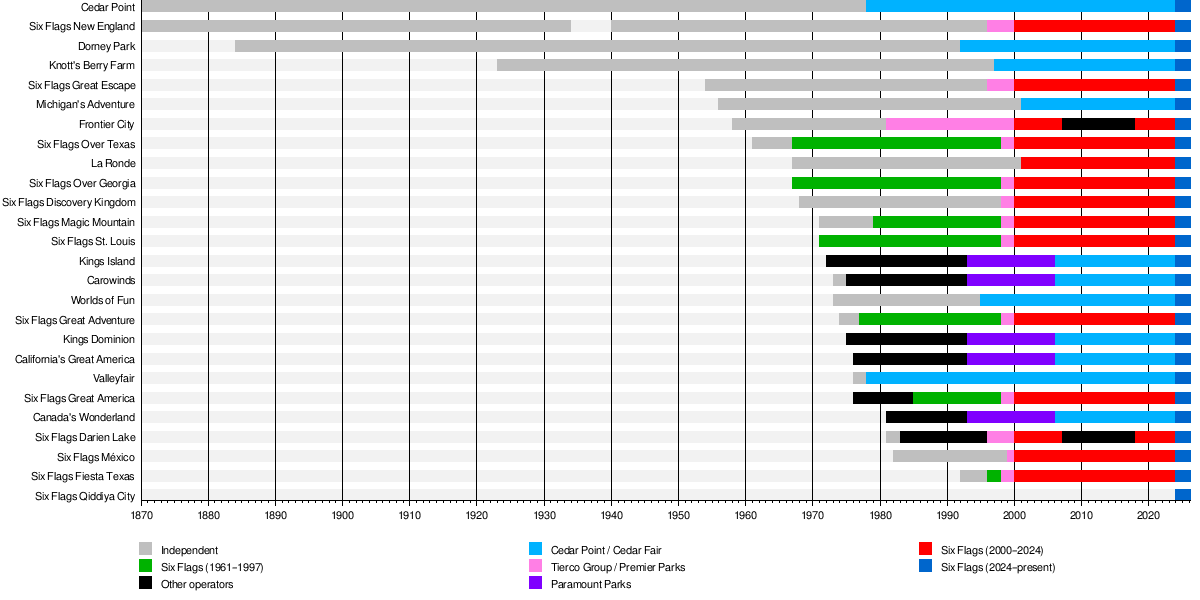
Water Parks for Splashing Fun
Most Six Flags water parks fall into three main groups:
- Hurricane Harbor — These water parks often have a Caribbean theme. Some are stand-alone, while others are part of an amusement park.
- Schlitterbahn — These are water parks mostly found in Texas. They are stand-alone properties.
- Soak City — These water parks are usually next to an amusement park. Admission is often included with the amusement park ticket.
Water Parks Inside Amusement Parks
These water parks are part of a larger theme park and are not counted as separate locations.
| Name | Location | Year opened | Associated theme park | Notes |
|---|---|---|---|---|
| Carolina Harbor | Charlotte, North Carolina | 1982 | Carowinds | Joined Cedar Fair after the 2006 purchase of Paramount Parks. |
| Six Flags Hurricane Harbor | Queensbury, New York | 1995 | Six Flags Great Escape | Acquired with the park in 1996. |
| Six Flags Hurricane Harbor Atlanta | Austell, Georgia | 2014 | Six Flags Over Georgia | — |
| Six Flags Hurricane Harbor St. Louis | Eureka, Missouri | 1999 | Six Flags St. Louis | — |
| Six Flags Hurricane Harbor Darien Lake | Darien, New York | 1990 | Six Flags Darien Lake | Operations leased by the former Six Flags in 2018. |
| Six Flags Hurricane Harbor New England | Agawam, Massachusetts | 1997 | Six Flags New England | — |
| Six Flags Hurricane Harbor San Antonio | San Antonio, Texas | 1992 | Six Flags Fiesta Texas | — |
| Oceans of Fun | Kansas City, Missouri | 1982 | Worlds of Fun | Acquired by Cedar Fair in 1995. |
| Soak City | Doswell, Virginia | 1992 | Kings Dominion | Joined Cedar Fair after the 2006 purchase of Paramount Parks. |
| Soak City | Mason, Ohio | 1989 | Kings Island | Joined Cedar Fair after the 2006 purchase of Paramount Parks. |
| Soak City | Shakopee, Minnesota | 1983 | Valleyfair | — |
| South Bay Shores | Santa Clara, California | 2004 | California's Great America | Joined Cedar Fair after the 2006 purchase of Paramount Parks. |
| Splash Works | Vaughan, Ontario | 1992 | Canada's Wonderland | Joined Cedar Fair after the 2006 purchase of Paramount Parks. |
| WildWater Adventure | Muskegon, Michigan | 1991 | Michigan's Adventure | Acquired by Cedar Fair in 2001. |
| Wildwater Kingdom | Allentown, Pennsylvania | 1985 | Dorney Park | Acquired by Cedar Fair in 1992. |
| Wild West Water Works | Oklahoma City, Oklahoma | 2017 | Frontier City | Operations leased by Six Flags. |
Standalone Water Parks
These water parks have their own entrance and are counted as separate parks by Six Flags.
| Name | Location | Year opened | Notes |
|---|---|---|---|
| Cedar Point Shores | Sandusky, Ohio | 1988 | Located next to Cedar Point. |
| Knott's Soak City | Buena Park, California | 2000 | Located next to Knott's Berry Farm. |
| Schlitterbahn Galveston | Galveston, Texas | 2006 | Purchased by Cedar Fair in 2019. |
| Schlitterbahn New Braunfels | New Braunfels, Texas | 1979 | Purchased by Cedar Fair in 2019. |
| Six Flags Hurricane Harbor Arlington | Arlington, Texas | 1983 | Located across from Six Flags Over Texas. |
| Six Flags Hurricane Harbor Concord | Concord, California | 1995 | Operations leased by the former Six Flags in 2017. |
| Six Flags Hurricane Harbor Chicago | Gurnee, Illinois | 2005 | Located next to Six Flags Great America. |
| Six Flags Hurricane Harbor Los Angeles | Valencia, California | 1995 | Located next to Six Flags Magic Mountain. |
| Six Flags Hurricane Harbor New Jersey | Jackson, New Jersey | 2000 | Located in the Six Flags Great Adventure Resort. |
| Six Flags Hurricane Harbor Oaxtepec | Oaxtepec, Mexico | 2017 | Purchased by the former Six Flags in 2017. |
| Six Flags Hurricane Harbor Oklahoma City | Oklahoma City, Oklahoma | 1981 | Operations leased by Six Flags. |
| Six Flags Hurricane Harbor Phoenix | Phoenix, Arizona | 2009 | Operations leased by Six Flags. |
| Six Flags Hurricane Harbor Rockford | Cherry Valley, Illinois | 1984 | Operated by Six Flags under a lease. |
| Six Flags Hurricane Harbor Splashtown | Spring, Texas | 1984 | Operations leased by the former Six Flags in 2017. |
| Six Flags White Water | Marietta, Georgia | 1983 | Six Flags will take full ownership by 2027. |
Resorts for Extended Stays
| Name | Location | Year opened | Notes |
|---|---|---|---|
| Castaway Bay | Sandusky, Ohio | 2004 | Part of Cedar Point Resorts, with an indoor water park. |
| Cedar Point Express Hotel | Sandusky, Ohio | 2017 | Part of Cedar Point Resorts. |
| Hotel Breakers | Sandusky, Ohio | 1905 | Part of Cedar Point Resorts. |
| Knott's Hotel | Buena Park, California | 1968 | Located near Knott's Berry Farm. |
| Sawmill Creek Resort | Huron, Ohio | 1972 | Part of Cedar Point Resorts, eight miles from the park. |
| Six Flags Darien Lake Hotel & Campground | Darien, New York | 1954 | Located across from Six Flags Darien Lake, with a hotel, campground, and entertainment center. |
| Six Flags Great Escape Lodge | Queensbury, New York | 2006 | Located across from Six Flags Great Escape, with an indoor water park. |
| Six Flags Savannah Sunset Resort & Spa | Jackson, New Jersey | 2024 | Located within the Six Flags Great Adventure Resort. |
| The Resorts at Schlitterbahn New Braunfels | New Braunfels, Texas | 1979 | Located within Schlitterbahn New Braunfels. |
Other Fun Properties
| Name | Location | Year opened | Type | Notes |
|---|---|---|---|---|
| Cedar Point Sports Center | Sandusky, Ohio | 2019 | Sports complex | Part of Cedar Point's complex. |
| Six Flags Wild Safari Adventure | Jackson, New Jersey | 1974 | Safari park | Located in the Six Flags Great Adventure Resort. |
Former Properties
| Name | Location | Year opened | Year closed/sold | Notes |
|---|---|---|---|---|
| Six Flags America | Woodmore, Maryland | 1974 | 2025 | The park closed on November 2, 2025. |
| Six Flags Hurricane Harbor Maryland | Woodmore, Maryland | 1982 | 2025 | Located within Six Flags America. The park closed on September 6, 2025. |
How Six Flags is Run
The Leadership Team
A team of experienced leaders helps guide Six Flags. They make important decisions for the company's future. As of January 2026, Marilyn Spiegel is the board chair, and John Reilly is the CEO and president.
The daily operations of Six Flags are managed by a team of executives. As of January 2026, this team includes John Reilly (CEO and president), Tim Fisher (chief operating officer), and Brian Witherow (chief financial officer).
Company Finances
Like any big company, Six Flags keeps track of its money. In 2025, the company faced some financial challenges. This was partly due to bad weather affecting park visits.
| Year | Revenue | Net income | Total assets | Employees |
|---|---|---|---|---|
| 2024 | 2.71 | −0.231 | 9.13 | 98,000 |
Marketing and Fun Characters
Spreading the Word About Fun
In April 2025, Six Flags launched a new advertising campaign called "We're Serious About Fun." This campaign introduced a new mascot character, the Funsultant. You could see these ads on TV, online, and in other places.
Characters and Partnerships
Six Flags has special agreements to use popular characters. They can use Warner Bros. characters like Looney Tunes and DC Comics heroes in most of their North American parks. They also have an agreement to use Peanuts characters in some parks in the U.S. and Canada until 2030.
You'll also find other partners in the parks. These include food brands like Blue Bunny Ice Cream, Coca-Cola, and Frito-Lay.
Fast Lane: Skip the Lines!
Fast Lane is a special system at Six Flags parks. For an extra cost, visitors get a wristband. This lets them use a shorter line for most rides. During Halloween events, there's also "Fright Lane" for haunted attractions.
This system was first used at Cedar Fair parks in 2011. After the 2024 merger, all the former Six Flags parks switched to the Fast Lane system in January 2026. It replaced their old virtual queuing system called The Flash Pass.
See also
- Holiday in the Park
- Incidents at Six Flags parks
- Six Flags Fright Fest
 | Audre Lorde |
 | John Berry Meachum |
 | Ferdinand Lee Barnett |


